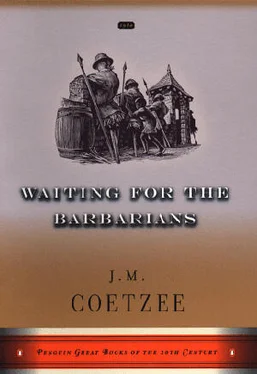Three nights in succession, now, I visit her in her little room, bringing presents of cananga oil, sweets, and a jar of the smoked fish-roe I know she loves to wolf down in private. When I embrace her she closes her eyes; tremors of what seem to be delight run through her. The friend who first recommended her to me spoke of her talents: "It is all playacting of course," he said, "but in her case the difference is that she believes in the role she plays." For myself, I find I do not care. Captivated by her performance, I open my eyes in the midst of all the fluttering and shivering and moaning, then sink back into the dark river of my own pleasure.
I spend three days of sensual languor, heavy-lidded, sleekly aroused, daydreaming. I return to my rooms after midnight and slip into bed, paying no attention to the obdurate form beside me. If I am woken in the morning by the sound of her preparations, I feign sleep till she is gone.
Once, happening to pass the open kitchen door, I glance in. Through wraiths of steam I see a stocky girl seated at a table preparing food. "I know who that is," I think to myself with surprise; nevertheless, the image that persists in my memory as I cross the yard is of the pile of green marrows on the table in front of her. Deliberately I try to shift my mind's gaze from the marrows back to the hands that slice them, and from the hands to the face. I detect in myself a reluctance, a resistance. My regard remains dazedly fixed on the marrows, on the gleam of light on their wet skins. As if with a will of its own, it does not move. So I begin to face the truth of what I am trying to do: to obliterate the girl. I realize that if I took a pencil to sketch her face I would not know where to start. Is she truly so featureless? With an effort I concentrate my mind on her. I see a figure in a cap and heavy shapeless coat standing unsteadily, bent forward, straddle-legged, supporting itself on sticks. How ugly, I say to myself. My mouth forms the ugly word. I am surprised by it but I do not resist: she is ugly, ugly.
I come back on the fourth night in a bad temper, thrashing about my rooms noisily, not caring who is woken. The evening has been a failure, the current of renewed desire is broken. I throw my boots on the floor and climb into bed spoiling for a quarrel, longing for someone to blame, ashamed too of my childishness. What this woman beside me is doing in my life I cannot comprehend. The thought of the strange ecstasies I have approached through the medium of her incomplete body fills me with a dry revulsion, as if I had spent nights copulating with a dummy of straw and leather. What could I ever have seen in her? I try to recall her as she was before the doctors of pain began their ministrations. It is impossible that my gaze did not pass over her as she sat with the other barbarian prisoners in the yard the day they were brought in. Somewhere in the honeycomb of my brain, I am convinced, the memory is lodged; but I am unable to bring it back. I can remember the woman with the baby, even the baby itself. I can remember every detail: the frayed edge of the woollen shawl, the patina of sweat under the wisps of fine baby-hair. I can remember the bony hands of the man who died; I believe I can even, with an effort, recompose his face. But beside him, where the girl should be, there is a space, a blankness.
I wake up in the night with the girl shaking me and the echo of a thin moan still hanging in the air. "You were shouting in your sleep," she says. "You woke me up."
"What was I shouting?"
She mumbles something, turns her back on me.
Later in the night she wakes me again: "You were shouting."
Thick-headed and confused, angry too, I try to look into myself but see only a vortex and at the heart of the vortex oblivion.
"Is it a dream?" she says.
"I cannot remember any dream."
Can it be that the dream of the hooded child building the snow-castle has been coming back? If it has, surely the taste or the smell or the afterglow of the dream would linger with me.
"There is something I must ask you," I say. "Do you remember when you were brought here, into the barracks yard, for the first time? The guards made you all sit down. Where did you sit? Which way did you face?"
Through the window I can see streaks of cloud racing across the face of the moon. Out of the darkness beside me she speaks: "They made us sit together in the shade. I was next to my father."
I summon up the image of her father. In silence I try to re-create the heat, the dust, the smell of all those tired bodies. In the shade of the barracks wall I seat the prisoners one by one, all that I can remember. I put together the woman with the baby, her woollen shawl, her bare breast. The baby wails, I hear the wail, it is too tired to drink. The mother, bedraggled, thirsty, looks at me, wondering if I can be appealed to. Next come two hazy forms. Hazy but present: I know that with an effort half of memory, half of imagination, I can fill them out. Then comes the girl's father, his bony hands folded before him. His cap is tipped over his eyes, he does not look up. Now I turn to the space beside him.
"On which side of your father were you sitting?"
"I sat to his right."
The space to the right of the man remains blank. Concentrating painfully I see even the individual pebbles on the earth beside him and the texture of the wall behind.
"Tell me what you were doing."
"Nothing. We were all very tired. We had walked since before dawn. We stopped to rest only once. We were tired and thirsty."
"Did you see me?"
"Yes, we all saw you."
I clasp my arms around my knees and concentrate. The space beside the man remains empty, but a faint sense of the presence of the girl, an aura, begins to emerge. Now! I urge myself: now I will open my eyes and she will be there! I open my eyes. In the dim light I make out her shape beside me. With a rush of feeling I stretch out to touch her hair, her face. There is no answering life. It is like caressing an urn or a ball, something which is all surface.
"I have been trying to remember you as you were before all this happened," I say. "I find it difficult. It is a pity you can't tell me." I do not expect a denial, and it does not come.
* *
A detachment of new conscripts has arrived to take the places of men who have completed their three-year spell on the frontier and are ready to leave for their homes. The detachment is led by a young officer who is to join the staff here.
I invite him, with two of his colleagues, to dine with me at the inn. The evening goes well: the food is good, the drink plentiful, my guest has stories to tell about his journey, undertaken in a hard season in a region wholly foreign to him. He lost three men on the way, he says: one left his tent in the night to answer a call of nature and never returned; two more deserted almost within sight of the oasis, slipping away to hide in the reeds. Troublemakers, he calls them, whom he was not sorry to be rid of. Still, do I not think their desertion was foolish? Very foolish, I reply; has he any idea why they deserted? No, he says: they were fairly treated, everyone was fairly treated; but then of course conscripts… He shrugs. They would have done better to desert earlier, I suggest. The country around here is inhospitable. They are dead men if they have not found shelter by now.
We speak of the barbarians. He is convinced, he says, that for part of the way he was trailed at a distance by barbarians. Are you sure they were barbarians? I ask. Who else could they have been? he replies. His colleagues concur.
I like this young man's energy, his interest in the new sights of the frontier region. His achievement in bringing his men through in this dead season is commendable. When our companions plead the lateness of the hour and depart, I press him to stay. Past midnight we sit talking and drinking. I hear the latest news from the capital, which I have not seen for so long. I tell him of some of the places I look back on with nostalgia: the pavilion gardens where musicians perform for the strolling crowds and one's feet rustle through fallen autumn chestnut leaves; a bridge I remember from which one sees the reflection of the moon on the water that ripples around the pediments in the shape of a flower of paradise.
Читать дальше












